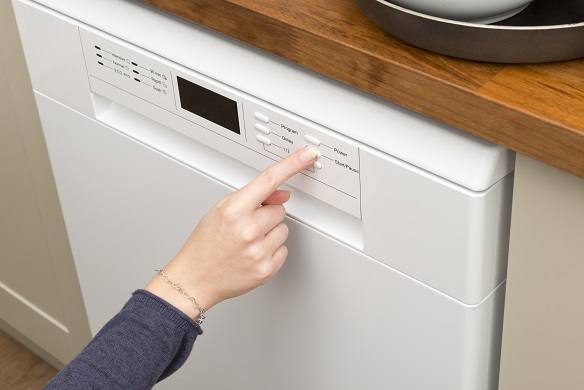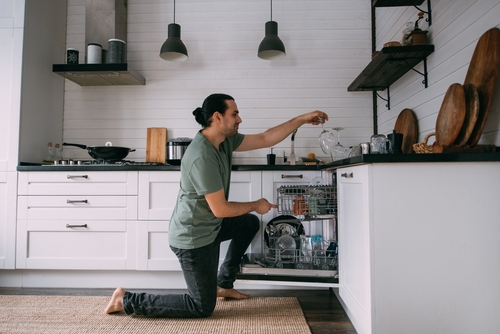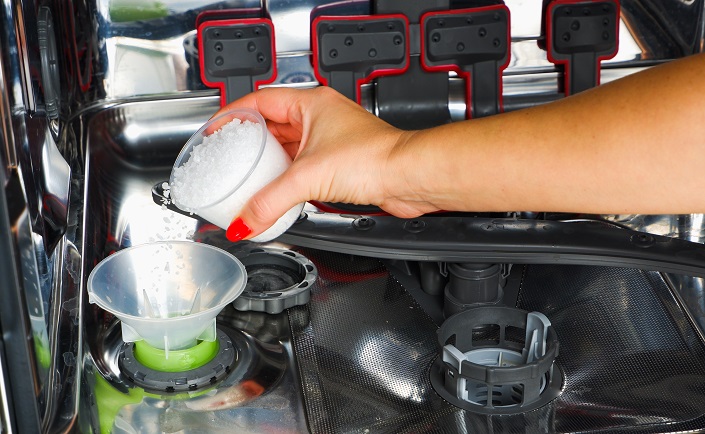Although your dishwasher can take all the strain away from washing up and helps hygienically clean your dishes, it still needs some assistance from time to time in order to effectively be able to perform. There are a number of issues that might occur with your dishwasher; we've picked out the top 5 common faults and how to fix them. Anything more serious and you could need an expert dishwasher repair.
Please make sure you follow these instructions fully and as always, check the user manual for details on your specific appliance, but this guide will give you some general advice. If you have any problems with carrying out this maintenance, please contact us.
My dishwasher cycle won't start

If your dishwasher doesn't start, the steps below may help you find and pinpoint where the problem is coming from, before deciding that there is a problem with your appliance itself
- Check that you have the power switched on to the machine from the mains.
- Check the plug and power cable for damage.
- Try another electrical appliance in the socket. This will help you check that the socket is not faulty.
- Check that the dishwasher door is fully closed properly.
- Check that the mains water is connected and the tap is properly turned on (the ‘on’ position is normally when the tap handle is pointing at, or in line with the water supply hose).
- Check that the filters are not blocked.
- Some dishwashers have a ‘Pause’ function, so check that this is not activated.
- Some dishwashers also have a ‘reset’ function. Typically, this is done by switching off the dishwasher and then switching it on again after one minute and resetting the required program, but check the user manual for precise details on your appliance.
My dishwasher isn’t cleaning properly
- Make sure that the baskets are not overloaded and that all items are evenly arranged within both baskets. Check that no larger items are obstructing the spray arms and preventing them from turning.
- The wash cycle may be too gentle. Make sure that you choose the correct type of wash cycle for the amount you have loaded into the dishwasher and how dirty items are and that the correct amount and type of detergent has been used.
- Make sure that the lid on the rinse aid compartment is properly closed.
- Ensure that the filters are not blocked-up.
- Make sure that the holes in the spray arms are not blocked.
- The refined salt (dishwasher salt) level may be too low. Check the user manual for salt-filling recommendations.
- Make sure that the top basket is properly adjusted for the size of items in the bottom rack.
Check for blockages

If your dishwasher seems to be blocked and not draining, look through the steps below for some guidance.
- Pull out the lower tray to check the dishwasher filters.
- Remove any hard pieces of food debris around the bottom of the machine, as they can block the filters and sometimes cause damage to the pump or scratch dishes.
- Remove the filter and wash out any debris (pay close attention to the filter sensor if your dishwasher has one).
- Check for blockages in the drain hose that may prevent waste water from draining effectively. Also, check that the drain hose is not trapped under or behind the dishwasher.
My dishwasher won't empty
If your dishwasher wonʼt empty the water out, check through the general hints in the steps below, but make sure that the wash-cycle has actually properly finished first. Always check for specific details on your appliance in the user manual.
- If you have the dishwasher drainage hose over the side of your kitchen sink (using the support crook), make sure that the hose is well secured and that the open end of the hose cannot become submerged under water.
- Check the drainage hose for blockages.
- Check that the hoses are not trapped or crushed behind or under the dishwasher.
- Check that the filters are properly in place and not blocked or obstructed.
My dishwasher is making a buzzing noise
If your dishwasher makes an unusual noise, always check the user manual for details on your specific appliance, but the steps below will help give you some general guidance. If you've misplaced or lost your user manual, you can download a replacement manual.
- A buzzing noise heard at the start of a program may be due to the water supply being off. Check that the water tap to the dishwasher is turned on (the ‘on’ position is normally when the tap handle is pointing at or in line with the water supply hose).
- Check that the water inlet pipe is not kinked or crushed behind or under the dishwasher.
- Noise can also be caused by crockery and utensils rattling against each other or being knocked by spray arms. Always make sure that items are correctly loaded and not obstructing the spray arms.
- Sometimes, even too much detergent or the wrong type of detergent can create additional noise inside the dishwasher. Always make sure that you use proper dishwasher detergent and that you put the correct amount in your appliance. Check the details in the user manual for recommendations for your specific dishwasher.
If the above actions haven’t rectified your issue or you don’t feel confident to undertake them, it’s time to call a qualified engineer to fix your dishwasher.
Our blog is loaded with more related articles

Dishwasher tips
How to use your dishwasher and save energy
In this guide, we’ll give you the tips you need to save energy and money while making your dishes sparkle. The good news...
Read more

Dishwasher tips
A guide to rinse aids and dishwasher salts
From whether you need rinse aids to understanding the purpose of dishwasher salt, we’ve put together a guide answering ev...
Read more

Environmental sustainability
Simple ways to save water at home
For water saving week, we've put together quick ways to save water at home. From leaking taps, too many baths and overfilli...
Read more
